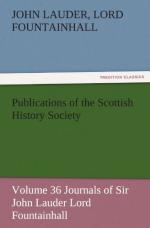[22] A devotional diary, for
1700, apparently one of a series,
preserved
in the Edinburgh University Library, No. 274, and an
undated
letter in the Dick Lauder MSS. about the election of
a
‘godly,
primitive, and evangelicall pastor,’ lead me
to think that
his
views were Calvinistic, and not out of sympathy with
the
Presbyterian
Establishment of the Revolution.
In the present volume, p. 229, there is a striking example of his sympathy with the royal prerogative. He says it was believed that the project of Union was ’mainly set on foot by his Majestie and so much coveted after by him that he may rid himselfe of the House of Commons, who have been very heavy on his loines, and the loins of his predecessors.... I confesse the king has reason to wrest this excessive power out of the Commons their hand, it being an unspeakable impairment of the soveraintie, but I fear it prosper not.’
His repugnance to anything savouring of revolutionary methods, combined with his always candid recognition of merit, appears in his observation when Sidney was executed.
[Sidenote: H.O. p. 110.]
He was a gallant man, yet had he been so misfortunat as ever to be on the disloyal side, and seemed to have drunk in with his milk republican principles.’ In December 1684 Baillie of Jerviswood was prosecuted for being art and part in a treasonable conspiracy in England, along with Shaftesbury, Russell, and others. Lauder and Sir George Lockhart were commanded on their allegiance to assist the King’s Advocate in the prosecution. The Court, after deliberating from midnight till three in the morning, brought in a verdict finding ’his being art and part of the conspiracy and design to rise in arms, and his concealing the same proven,’ He was hanged and quartered the same day. Fountainhall did not disapprove of his condemnation. He says, ’he carried all this with much calmness and composure of mind; only he complained the time they had given him to prepare for death was too short, and huffed a little that he should be esteemed guilty of any design against the life of the King or his brother, of which he purged himself, as he hoped to find mercy, so also he denied any purpose of subverting the monarchial government, only he had wished that some grievances in the administration of our affairs might be rectified and reformed; but seeing he purged not himself of the rest of his libel, his silence as to these looked like a tacit confession and acknowledgment thereof.’




